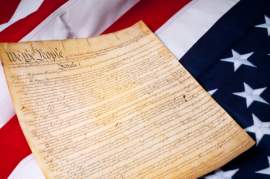
Judicial Review Explained

Popular In Constitution
Purpose Of Lifetime Appointment And Pros And Cons Enumerated Powers Bicameral Legislature Background Article 3 Of The Constitution We The People 1st Amendment Who Wrote The Constitution Judicial Review Equal Protection Clause 5th Amendment 10th Amendment Three Fifths Compromise
One of the basic rights of the United States Supreme Court, and a primary foundation for the power which it exercises over the American legal system and the country as a whole, is the doctrine of judicial review. This power consists of the ability of the Supreme Court to decide upon "review" that a piece of legislation or some other form of Government action is not permitted under the Constitution and can, therefore, be judged "unconstitutional". The Supreme Court established this privilege early in its existence and was empowered as a significant institution in the American Government primarily by exercising it.
The power of judicial review was established by the case of Marbury v. Madison, which the Court heard in 1803 under Chief Justice John Marshall, who is generally recognized for this and for many subsequent decisions for gaining the Supreme Court its central place in the United States political system. Previous to its implementation in law, the basic concept of judicial review had been discussed by Alexander Hamilton in the 78th issue of the Federalist Papers.
William Marbury filed suit when Secretary of State William Madison
prevented him from being appointed as District of Columbia Justice of the
Peace. A prominent supporter of President John Adams, Marbury had been given
the commission to assume the aforementioned office toward the end of that
administration but did not have the ability to have his commission delivered
before Adams' term came to an end. The succeeding President Jefferson blocked
all of the commissions which had been issued by his predecessor from being
delivered, giving this task over to the Secretary of State.
Marbury thus sued Madison to
compel him to deliver the commission, drawing on the Judiciary Act of 1789 to make his case and
submitting his case directly to the Supreme Court. The Court thus held original
jurisdiction over the matter, a relatively infrequent occurrence in that the
Supreme Court more regularly holds appellate jurisdiction over the proceedings
of lower courts.
The decision of the Supreme Court found against
Marbury's case while upholding the validity of his complaint and suggesting, in
the opinion delivered by John Marshall, that Marbury find some other means for
remedying it. The judicial review which Marshall had conducted of the portions
of the Judiciary Act cited by Marbury demonstrated to the Court, however, that
the Congressional legislation had attempted to give the Supreme Court powers
which it did not hold under the Constitution, such as would have allowed it to
enact Marbury's request.
Marshall derived the principle of judicial review from the fact that the American legal system as a whole is based on the written authority of the Constitution and that any action by the Government which runs up against that authority cannot be allowed. In light of the status of the Supreme Court as the ultimate arbiter in the land, it could therefore effectively exercise the power of striking down laws by ruling them "unconstitutional". Marshall's argument has been accepted as the foundation for the principle of judicial review.
NEXT: Police Power Explained




















